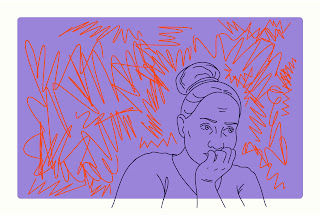What are anxiety disorders?

When we speak about anxiety it is essential to realize that people experience anxiety all their lives. This is your brain’s way of fending off stress and informing you of the danger that lies ahead.
Everyone experiences anxiety sometimes or at some point in their lives. For instance, you may become anxious over a task at the workplace, before an exam or test, before deciding for others.
However, anxiety disorders are different and can be treated to some extent provided that the patient agrees on the severity of his symptoms. They are a category of mental disorders that are characterized by relentless and excessive amounts of anxiety and fear. Severe anxiety prevents you from going to work or school, attending family functions, and other events where signs or symptoms may be triggered. Available treatment shows that most people with anxiety disorders are capable of overcoming their conditions.
Types of anxiety disorder:
There are several types of anxiety disorders, including:
Generalized anxiety disorder:
You worry too much and are overly anxious about tasks that are typical of everyday life. These feelings can be chronic and occur at all times of the day and differently each day.
Panic disorder:
You feel sudden and intense fear and such fear triggers a panic attack. In a panic attack, you sweat, get chest pains, and have palpitations, that is, your heart beats very fast. At times, you may be C + choked or have the feeling of heart failure. It might make you afraid of having another attack, which makes you attempt to avoid things that may have brought it on. You have an extreme phobia in which you panic whenever you are in a situation that seems you may hardly call for help in case of an incident. For instance, you may fear or become nervous when traveling by flight, in a bus, train, or car, in an enclosed place, in a queue with other people, or if you are out of your compound.
Separation anxiety:
Often, young children are not the only ones who get scared or anxious when a near and dear one goes away for a while. This condition is not peculiar to anyone, either male or female, or any age bracket; anyone can be diagnosed with it. If you do, you will feel very anxious or fearful as soon as a person you have a close bond with steps out of your sight. You will always be anxious that one day a misfortune can befall your close one. If you’re older, probably, you might develop this anxiety after you have experienced a terrible event.
Anxiety Disorder Symptoms:
Majority of the anxiety disorders have a common manifesting feature of being excessively fearful or worried. Other symptoms may include turning red, not being able to breathe, sleeping, sitting still, and paying attention to a task. Specific symptoms that are associated with the given type of anxiety are different.
Common symptoms are:
Panic, fear, and uneasiness, Some incidents reported comprised feelings of panic, doom, or danger.
Problems concerning sleep or excessive weakness. Speaking of the things that are their characteristics, it is possible to indicate that one of them is the inability to remain calm and still.
- Numbness and/or tingling especially in the hands and feet, cold sweat, and pale skin.
- Shortness of breath
- Markedly higher rate and rhythm of breathing than normal or sho panted (hyperventilation).
- Palpitations or tachycardia
- Trembling
- Dry mouth
- Gastrointestinal (GI) issues
- Nausea
- Tense muscles
- Dizziness or feeling weak
- Repeating a problem thought in one’s mind time and again without the ability to cease (rumination)
- Inability to concentrate
- Avoiding the feared objects or places with great rigidity or preoccupation
Causes of Anxiety Disorder:
It is not clearly understood where anxiety disorders are derived from. Some causes of anxiety disorders include:
Genetics. These disorders may be hereditary and get passed from one generation to the other.
Brain chemistry. Studies have indicated that anxiety disorders may be associated with abnormal wiring of the brain that handles fear and other feelings.
Environmental stress. These are those events that have been experienced or observed to cause stress. Possible life events associated with anxiety disorders include; child sexual and physical abuse, bereavement or threatened bereavement; attack or threatened attack, or witnessing violence.
Drug or alcohol withdrawal or misuse. Some medicines can be utilized to mask or lessen specific kinds of anxiety symptoms. It is imperative to establish that anxiety disorder contacts with alcohol and substance use.
Medical conditions. Other conditions of the heart, lungs, or thyroid can manifest symptoms that are similar to anxiety disorders or that could worsen your anxiety symptoms. GI disorders for instance IBS and certain respiratory conditions asthma and tumours that produce certain hormones are prevalent in anxiety.
One should mention a terrible experience to a physician for a complete check-up to ensure that the problem is not another disease. Also, such symptoms are indicative of a specific disease or signify a first sign of the possible disease.
Certain medications. Some stimulants, notably anti-anxiety drugs, cause anxiety symptoms when their intake is stopped.
probability factors associated with Anxiety Disorder:
Some factors predispose to the development of an anxiety disorder. In these terms, they are known as risk factors. There are modifiable and nonmodifiable risk factors as a part of life.
Risk factors for anxiety:
Risk factors for anxiety disorders include:
Mental health conditions. Some mental illnesses put you at a higher risk of developing another, for instance, if you are depressed, you are likely to develop an anxiety disorder.
Childhood sexual abuse. Childhood maltreatment predictors of anxiety disorders can include such things as being verbally, physically, or sexually abused or neglected during the growing years.
Trauma. Suffering a trauma makes one develop a predisposition for posttraumatic stress disorder which in turn results in cases of panic attacks.
Negative life events. Other factors include being a victim of stress and negative life events; for instance, losing a parent during childhood raises one’s risk of developing an anxiety disorder. Accumulated stressful events can also increase the risk of a person; experiencing more than one or several minor but stressful events in life.
Serious sickness or long-term disease of the person. Health anxiety, or being anxious about yourself or someone close to getting ill, or living with someone who is, could stressful.
Substance abuse. Drinking alcohol and participating in the use of prohibited substances increase one’s vulnerability to an anxiety disorder. Others also self-medicate with these substances to mask or alleviate anxiety-related disorders.
Low self-esteem. Prejudiced self-images that one holds contribute to social phobia or social anxiety disorder.
Family history. Anxiety may be hereditary though there is no definitive proof of this as it is with most other illnesses.
Anxiety Disorder Diagnosis:
Anxiety disorder test:
They may use tests to eliminate other medical conditions that may be responsible for your symptoms. As a result, not one blood test can help point to anxiety disorders.
If your doctor cannot identify the cause of your complaints physically, you might be referred to a psychiatrist, psychologist, or any mental health practitioner.
Anxiety Disorder Treatments:
Today there are several treatments to decrease and control the manifestations of anxiety disorder. Typically, the individuals suffering from anxiety disorder have to pay a visit to the psychiatrist and are supposed to take some medicine and they also have to go for counseling.
Anxiety medication:
Several categories of medications are prescribed to patients with anxiety disorders. Discuss with your doctor or psychiatrist the advantages and disadvantages of each medicine to arrive at the most suitable drug to take.
Antidepressants.
Contemporary antipsychotic medications consisting of SSRIs and SNRIs are usually the initial medications prescribed to a person diagnosed with an anxiety disorder. Some examples of SSRIs are escitalopram, Lexapro and fluoxetine, Prozac. SNRIs include duloxetine and venlafaxine SNRIs; both are available in brand names Cymbalta and Effexor respectively.
Bupropion.
This is another class of drugs that fall under antidepressants and are frequently used in handling chronic anxiety. It does not operate in the same way as other medications such as SSRIs or SNRIs.
Other antidepressants. These are tricyclics and MAOIs antidepressants Tricyclic antidepressants are a class of antidepressants that includes amitriptyline, imipramine, and trimipramine, among others. They are not as conventional due to potential side effects like a drop in blood pressure, dry mouth, lack of vision, and inability to control the bladder for some of the users.
Another group of drugs used in the management of anxiety is benzodiazepines.
Beta-blockers.
This kind of high blood pressure drug is employed off label and it may help you if you are having physical signs of anxiety for example a fast heartbeat, shaking, and trembling. In acute anxiety attacks, a beta-blocker will assist you to do so.
Anticonvulsants.
These belong to the anti-seizure drugs commonly prescribed for epilepsy and are sometimes applied in addressing certain anxiety disorder manifestations.
Antipsychotics.
Small amounts of these drugs, are can be prescribed off label, to help make other forms of treatment more effective.
Buspirone (BuSpar). This drug belongs to the class of anxiety relievers often used to help those suffering from chronic anxiety. As with most medications, you will have to ingest it for a few weeks before you notice complete liberty from the symptoms. Herapies for anxiety
Psychotherapy.
It is a type of counseling that aims at teaching you how your emotions stimulate your behaviors. There is also talk therapy which is sometimes referred to as psychological counselling. One trained in mental health listens and speaks with you regarding your feelings and thoughts and teaches you how you can comprehend your thoughts and ideas and handle your anxiety disorder.
Cognitive behavioral therapy (CBT).
It can be described as a type of psychotherapy that aims to guide individuals on how they can change negative or that causes panic modes into positive modes. What they are taught on though are methods of handling those things that one may fear or those events that may cause worry without the occurrence of anxieties; this is called exposure therapy. It is also possible to have family CBT sessions in some facilities. Managing Anxiety Disorder Symptoms
These tips may help you control or lessen your symptoms: These tips may help you control or lessen your symptoms.
Learn about your disorder.
The better you are equipped with the medical information about you, the more capable are you of handling symptoms and complications on the way. Your doctor and clinical staff should be courteous and more than willing to help should you have any questions. Please always bear in mind that you are a member of your healthcare team. We must adhere to the prescriptions we have received from our health practitioners about the disease. Abruptly stopping the treatment is followed by negative effects and even exacerbation of the anxiety disorder.
Cut down on caffeine.
No caffeine-containing foods and beverages like coffee, tea, and cola, energy drinks, chocolate, and cocoa products, and any foods with caffeine as an ingredient. Caffeine is a stimulant and may positively change mood; however, it may worsen manifestations of anxiety disorders. Do not consume alcohol and take recreational street drugs. It is a fact that substance abuse creates the potential of having anxiety disorders.
Eat right and exercise.
Light and moderate exercises like jogging and cycling for instance allow a release of chemicals that reduce stress and improve mood in the body.
Get better sleep.
Sleeplessness and anxiety disorder are also known to be associated because the two share the common effects of sleep disturbances. Namely, make it important to get good rest. Establish a healthy pre-sleep routine. If you still are having issues with sleep, you should discuss it with your doctor. Learn to relax. Relaxation techniques interfere with your anxiety disorder management, and it is crucial to control it. Such things as taking a walk, doing meditation, or concentrating on something else after the working day might help you relax and twist the effect of your treatment.
Keep a journal.
It is also advised to put your thoughts on paper before the day is over so you can have sound sleep for the night without having to worry about the things that you did or did not get the chance to do during the day.
Manage your negative thoughts.
One should replace thoughts that cause stress with positive thoughts to help avoid getting anxious. This can be quite a difficult thing to do if one has specific kinds of anxiety disorders. Certainly, cognitive behavioral therapy will provide learning on how one can alter his thought processes.
Get together with friends.
However, no matter if the contact is face-to-face, by phone call, or by a computer link, social relationships promote the well-being and longevity of the individuals. Extremely close friends and those who chat with them for most of the time demonstrated significantly low social anxiety.
Seek support.
Thus, some individuals possess great benefits from talking about their problems with members of the same group, who go through the same conditions and feelings. Support/ self-help groups help you view your problems/ triumphs through the lens of those who are/ were once in the same position.
Ask your doctor:
Discuss with your doctor before using any non-prescription drugs and/or supplements. Some have substances that can cause deterioration in the symptoms of anxiety. Living With Anxiety Disorders
In any given case concerning anxiety, it is always a discomfort and a challenge to have to deal with as a patient. This is because anxiety makes one to be rather worried and scared most of the time, which is rather tiring. If someone with the symptoms has consulted a doctor, then they have shifted some of this worry onto the doctor.
Patients go through the phase of trial and error to arrive at an effective treatment that will suit them. More often than not, people with anxiety disorders have other types of these disorders and need multiple kinds of treatment. Considering the use of neuroleptics for self-management, the most frequent indication in combination with counseling is in the case of anxiety disorders. Honestly, diet and some medications can be very helpful in managing the condition of a person and lowering the severity of the illness.




